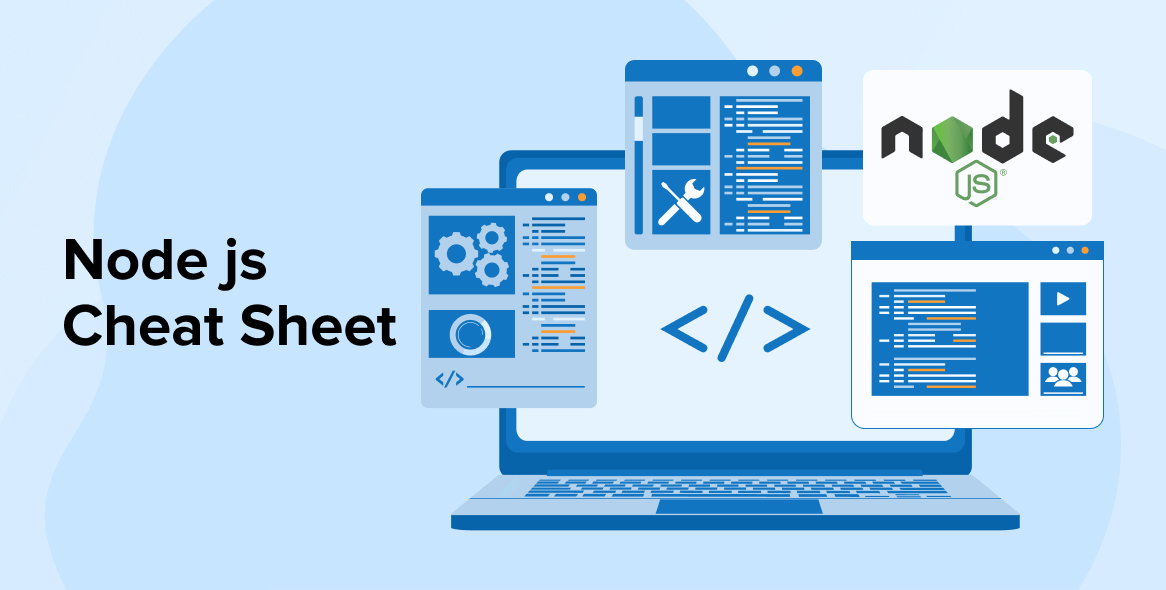
It is crucial for websites and online applications to have an engaging user interface that grabs and retains users’ attention. It is essential, however, to have a well-constructed backend development for a seamless frontend interface. Numerous backend technology solutions like Rails, Laravel, Django, and Node.js, offer application architecture in addition to monitoring, debugging, and database management tools. Utilizing back-end frameworks increases efficiency and streamlines the web application development process. Are you planning to hire a Django or Nodejs development services? Well, in this article, we compare Node js vs Django, two robust technology stacks for developing adaptable online and mobile apps with an excellent user interface.
In this Django vs. Node js debate, we will cover its key differences in order to help you pick the best one for your business needs.
1. Overview of Node and Django
Node.js is a cross-platform runtime environment used to develop quick and effective online web applications. It is built on Javascript code and may operate on both the client side and server side. Node.js garnered popularity because it is a simple tool for building scalable apps executing Javascript independent of the browser.
Django framework, in contrast, is a rising, cross-platform Python based framework. It emphasizes minimizing repetitive procedures and establishing a foundation for rapid web app development.
Despite the fact that both Node.js and Django are useful to construct web apps, they are distinct in their own ways. This blog post provides a contrast between the two technologies in terms of coding, design, safety, and execution.
The primary distinction between both Django and Node.js is that Django is a strong Python web framework that encourages rapid development to aid web developers in constructing web applications quickly and in a reasonable manner.
Both of these solutions are equally well-known and adaptable, making it difficult for programmers to choose which one would be suitable for their forthcoming project.
2. Node.js vs Django : Key Differences Between The Backend Technologies
2.1 Initial Release
Django – The Django web framework was initially introduced in 2005.
Node.js – Node.js is a javascript runtime environment that was published for the first time in 2009.
2.2 Performance
The performance of a web app increases with its speed. Loading timings, code improvement, configuration settings, server architectures, application capacity, and data sent to and from the server side all impact the performance of any online application.
However, when comparing the performance of these two technologies such as Node.js and Django, you should focus mostly on execution rate.
Node.js – Once you have more assets, you can complete a task more quickly. When it concerns executing, more and multiple threads result in faster job completion. Despite the fact that Node js employs the event-loop architecture V8 Javascript engine to maximize the utilization of single threads, it is slower than many threads.
Django – Django gets Python’s operational excellence. Utilizing many threads improves performance. Django offers application caching and database management, enabling you to increase efficiency even further.
2.3 Security
Node.js – Since Node.js does not provide standard privacy controls, your engineers may need to go the additional mile to make sure the safety of your web application. This step is essential, as the framework’s preset session cookie names might open your web application to attackers, one can say that there are more security flaws in here.
In particular, your web application may be susceptible to attacks such as Cross-Site Scripting (XSS), Cross-Site Request Forgery (CSRF), and SQL Injection.
Django – While comparing Node js vs Django, Django takes security extremely carefully. It sterilizes its data to avoid malicious injection via the web app’s entry inputs. It also processes SQL queries securely to prevent SQL injection attacks. Among the security measures offered by Django include XSS (cross-site scripting) security, Protection against cross-site request forgery (CSRF), SQL injection security, Clickjacking security, SSL/HTTPS, and Host header validation.
2.4 Scalability
Scalability refers to the capacity of a web application to accommodate a large number of users/customers while incorporating future-proof features. Scalable Web applications are adaptable, capable of adding new key features, and able to accommodate a large number of client side requests, real-time changes, and an expansion in workload.
While Node.js and Django are recommended frameworks for developing desired applications, let’s examine their scalability as application development tools.
Node.js – Node.js embraces microservices architecture excellently, which is a good paradigm for developing smaller, autonomous, and scalable apps. It facilitates rapid development of web applications with complex and extensive corporate applications.
Node.js and microservices architecture complement one another. While Node.js can accommodate hundreds of parallel concurrent requests/ queries without degrading performance, microservices may generate tiny modules for scalable web applications, a perfect mix for scalable mvp development and effective applications.
Because of its non-blocking I/O, event-driven design, and compatibility for microservices, Node js enables the development of real-time streaming, data-intensive, and networked applications.
Django – Django’s template fragment caching and the accessibility of services to manage data transfers, like conducting heavy loading for the apps, provide it an advantage for building web applications that are scalable, despite the limitations it imposes on app customization and flexibility. It may serve content, a huge number of downloads, and other app kinds.
Template fragment caching is a way to store the particular contents as opposed to re-rendering the blocks, being the most desirable need in scalable applications in which numerous activities and requests must be provided quickly.
Django may also be useful for full-stack development alongside using any other technology such as Angular or Node.js, to process these scalability statistics. Django is thus a viable solution for developing applications timely which are extremely scalable.
2.5 Programming
Node.js – Is this your debut experience with Node.js? Stress not! Its syntax makes it easier to write scripts for basic web applications. To create a comprehensive web application, you must grasp Node’s infrastructure, asynchronous programming, and native functions, thus, the learning curve may appear high.
However, if you are familiar with the Javascript runtime environment, you will find Node.js easier to learn due to the comparable syntax. Nevertheless, the complexity of Node.js may indeed cause you to spend extra time in development..
Django – Similar to Node.js, the Django framework can be easily taught. Furthermore, if you’re currently acquainted with the Python web framework, you’ll find this web framework intuitive. To deal with the Django framework, you must grasp the out-of-the-box techniques and functionalities, as well as the MTV architecture of the approach.
The framework strictly adheres to them during the development process. In particular, it enables you to accomplish more with less code, sparing you a great deal of time. Django has strong documentation and a network to assist with any issues.
2.6 Community Support
Django – Django has a smaller but relatively active community.
Node.js – Contrary to Django, NodeJS offers a vibrant community of knowledgeable users that enables developers to get help with their upgrades and personalization.
2.7 Cost
Node and Django – When you conserve development time, you end up saving costs on assets. Both Node.js and Django are free and open-source. However, Django is effective in terms of cost.
You now have a decent understanding of the functionalities of Node.js and Django. After understanding all the distinctions and contrasts, you may select any one of them or both according to your needs.
2.8 Speed of Development
Node and Django – Due to the flexibility of the programming language, the creation of a Python application is slightly faster than that of a JavaScript application. In addition, Django’s major aim is to enable developers to develop modern web applications promptly and with minimal code. The web framework provides a comprehensive set of tools created to help with rapid MVP creation and subsequent scaling.
However, if your engineers are utilizing Node.js, they will depend on npm packages to tackle certain common challenges. However, not all of these packages are adequately maintained, and some lack sufficient documentation or include flaws.
2.9 Customization
Node.js – Node.js is a highly configurable web development platform that places you in control from the start. Since you will be creating it all from the beginning, you will have complete control over how the web app is developed and how it functions. This feature is favored by seasoned Node.js programmers who are enthusiastic about creating diverse web apps and exploring the various Node js capabilities.
Django – With its large theme and module system, Django has much more to provide. It reduces a substantial amount of app development labor. However, there is a loophole; you cannot develop web applications which demand a structure similar to other MVC frameworks. It has little adaptability and modification potential. The design is model-template-view based; there is a limited amount of room to construct apps with Model-view-view-model structures, as well as software with more customization qualities and needs from scratch.
3. Conclusion
Node.js and Django are both programming languages with specialized platforms for developing web apps. Node.js is a server-side runtime environment, but it is perfect for programs that demand intense data processing, like social media sites, live-streaming applications, gaming applications, ecommerce projects and software development that does vital computations.
In contrast, Django is a rising Python framework that is suitable for backend and frontend development. It includes full-stack apps, software with quick development as a primary necessity, and novice developers. Django seems to be about your preference and experience, but Node.js is for skilled web developers who are required to create real-time applications. Django is designed for extremely scalable client side web applications. However, one would employ it if Python is their area of specialty.






This article provides a useful comparison between Node.js and Django such as their performance, scalability, security, and more. After reading this now I can confidently choose suitable technology for my next project.
Thanks for sharing this insightful information. This article compares Node.js and Django, two reliable technology stacks for creating flexible web and mobile applications with top-notch user interfaces. It really helps me a lot in choosing the perfect backend technology.
This blog shows the difference between Django and Node.js. It covers all its key differences, so Now I know which one is best for my next software project. Thanks for sharing!
Thank you for writing this useful blog post comparing Node.js and Django! Understanding the differences between these two well-known frameworks and their capabilities is interesting.
This article provided a clear overview of node and Django differences, making it easier for businesses to decide the best fit for their web development needs. Great job!
A perfect article to understand the comparison between two of the most popular backend frameworks: Node.js and Django. The article discusses almost every concept of these two frameworks.